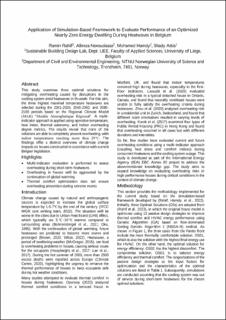| dc.contributor.author | Rahif, Ramin | |
| dc.contributor.author | Norouziasas, Alireza | |
| dc.contributor.author | Mohamed, Mohamed Hamdy Hassan | |
| dc.contributor.author | Attia, Shady | |
| dc.date.accessioned | 2024-04-04T11:14:26Z | |
| dc.date.available | 2024-04-04T11:14:26Z | |
| dc.date.created | 2024-01-23T17:01:19Z | |
| dc.date.issued | 2023 | |
| dc.identifier.issn | 2522-2708 | |
| dc.identifier.uri | https://hdl.handle.net/11250/3124842 | |
| dc.description.abstract | This study examines three optimal solutions for mitigating overheating caused by disruptions in the cooling system amid heatwaves in Brussels. For this aim, the three highest maximal temperature heatwaves are selected during the 2001-2020, 2040-2060, and 2080-2100 periods based on the Regional Climate Model (MAR) “Modèle Atmosphérique Régional". A multi-indicator approach is applied using operative temperature, heat index, thermal autonomy, and indoor overheating degree metrics. The results reveal that none of the solutions are able to completely prevent overheating, with indoor temperatures reaching more than 29℃. The findings offer a distinct overview of climate change impacts on houses constructed in accordance with current Belgian legislation. | en_US |
| dc.language.iso | eng | en_US |
| dc.publisher | International Building Performance Simulation Association (IBPSA) | en_US |
| dc.title | Application of Simulation-Based Framework to Evaluate Performance of an Optimized Nearly Zero Energy Dwelling During Heatwaves in Belgium | en_US |
| dc.title.alternative | Application of Simulation-Based Framework to Evaluate Performance of an Optimized Nearly Zero Energy Dwelling During Heatwaves in Belgium | en_US |
| dc.type | Journal article | en_US |
| dc.description.version | submittedVersion | en_US |
| dc.source.journal | Building Simulation Conference Proceedings | en_US |
| dc.identifier.doi | 10.26868/25222708.2023.1195 | |
| dc.identifier.cristin | 2233218 | |
| cristin.ispublished | true | |
| cristin.fulltext | preprint | |
| cristin.qualitycode | 1 | |
